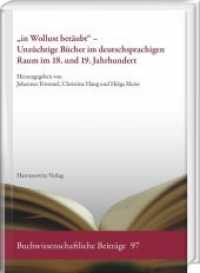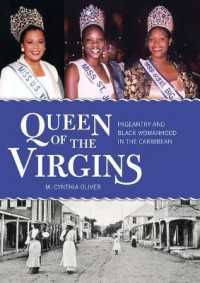- ホーム
- > 洋書
- > 英文書
- > Literary Criticism
Full Description
Highlights the spirituality and cosmopolitanism of four contemporary German Muslim writers, showing that they undermine the "clash-of-civilizations" narrative and open up space for new ways of coexisting.
At a time when the place of Muslims in German society is being disputed, this book explores how four contemporary German writers of Muslim backgrounds - Zafer Senocak, SAID, Feridun Zaimoglu, and Navid Kermani - point beyond identity politics and suggest new ways of thinking about religion and community. Twist highlights both the spirituality and the cosmopolitanism of these authors, bringing their thought into dialogue with the work of Jean-Luc Nancy.
Nancy is critical of communities based on a single guiding principle (be it God or Reason) and thus involving a universalizing core that leads to conflicts between identity groups. He proposes alternative notions of both religious faith (a postmonotheistic version with elements of mysticism) and community (spontaneous communities requiring no shared identity). Twist relates these arguments to post-9/11 debates over cosmopolitanism and religion, illuminating how the writers under study draw upon mystical Islam's deconstructive potential, finding divine insight in love, sex, music, pain, and beauty. Such a worldly and affective spirituality dispels associations between Islam and sexual conservatism while rejecting monotheistic ideology. Thus, unlike the homogenizing drive of universalist cosmopolitanism, these writers' nonfoundational conceptualizations undermine the twenty-first century's "clash-of-civilizations" narrative and open up space for new ways of coexisting.
JOSEPH TWIST is Fixed-term Lecturer in German at University College Dublin.
Contents
Preface
Introduction: Spirituality, Cosmopolitanism, and Muslim German Writers
Between Heaven and Earth, and Self and Other: Zafer Senocak's Übergang
Poetry, Prayer, and Apostasy: SAID's Psalmen
Romantic Religion and Counter-Enlightenment Cosmopolitanism: Feridun Zaimoglu's Liebesbrand
Between Pleasure and Terror: The Divine in Navid Kermani's Fiction
Conclusion: Intellectual, Spiritual, and Cultural Renewal
Notes
Bibliography
Index








